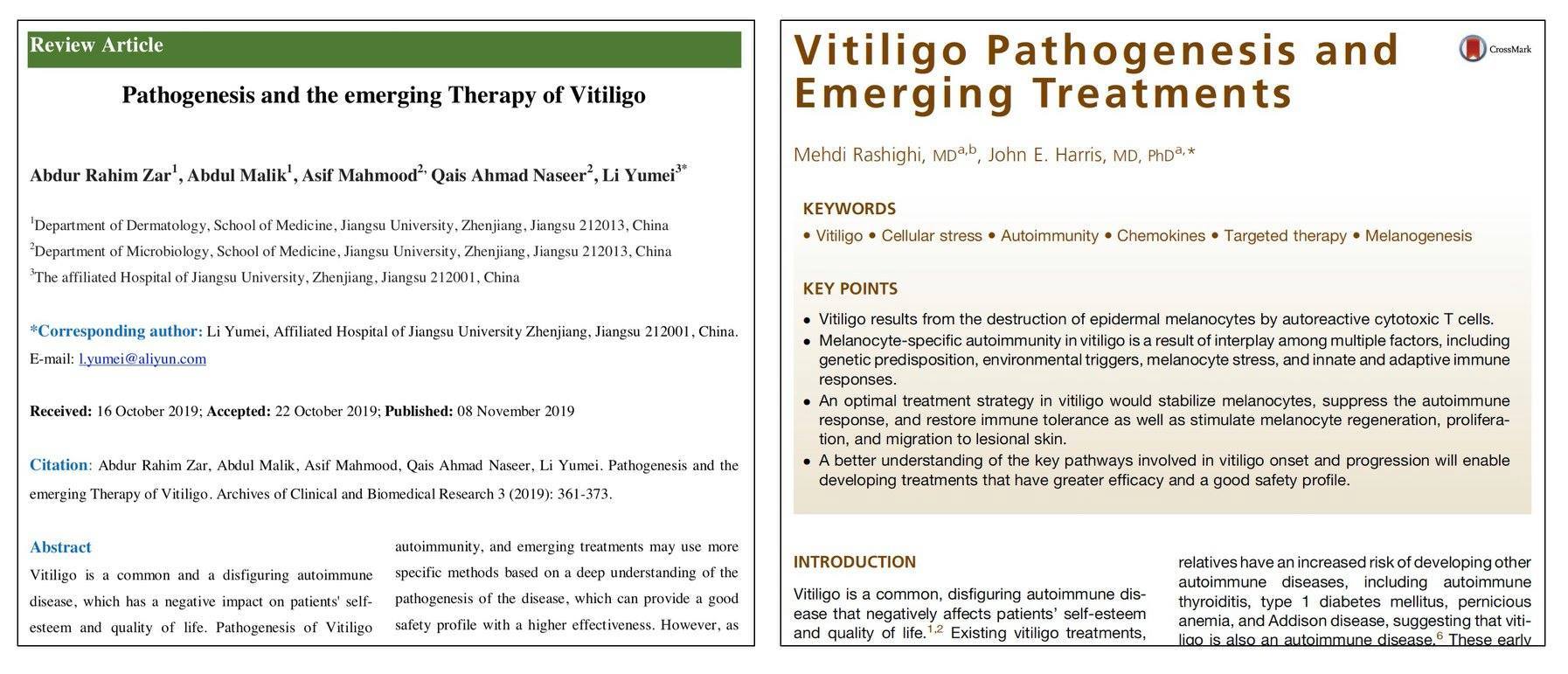New
Skepticism is Healthy. Beware of Fake Ads.
PLAGIARISM IN SCIENCE
Plagiarism is a major problem for research worldwide. There are certain circumstances that make plagiarism more or less grave and the plagiariser more or less responsible, — but it ain't good, period. Not only it distorts the scientific realm, but it also diverts jobs, promotions and funding from honest researchers to their disgraced peers.
A new a case of blatant plagiarism was spotted by Dr. John Harris earlier this week. As John writes in his Facebook post: "I'd say this new review from China about #vitiligo was accurate and well-written, but then I'd be biased because I wrote it with my fellow 2 years ago. They didn't even bother to redraw the figures. They still managed to add a word here and there to make it grammatically incorrect."
Like a fake research I wrote about in the previous newsletter, such a case of plagiarism can have serious medical consequences.
FAKE ADS
Clickbait headlines are a common sight in both mainstream and scientific media, as I wrote last week. But what about fake ads?
Much as the fake news creators gamed Facebook and Google’s algorithms, so have online sellers found the way to make a quick buck by gaming up their advertising networks.
Brazen entrepreneurs skirt the edge of advertising algorithms to promote all kinds of snake oils. They are able to target their unabashed advertising on individuals with remarkable accuracy and sophistication.
What's worse, they can instantaneously create personalized product pages on their websites — just for you. You'll get "individualized" pricing and specific wording based on your web browsing history, physical location, default system language and other settings, to maximize their profits from your ills.
(Yet, when we put our advertising on Google or Facebook to help people learn more about vitiligo, we often have ads rejected, for a bunch of reasons too weird to discuss here.)
IS THAT AD DECEPTIVE?
A three-part test used in the law can help us answer that question, courtesy of Truth In Advertising:
- Was a claim made? (i.e. "Pure Natural Product For Vitiligo")
- Is the claim likely to mislead a reasonable consumer? (i.e., "Get Results, Look Better Or Your Money Back!")
- Does the promise involve health or other important matter? (i.e., "<...> has worked for thousands of children, teenagers, and adults suffering from this skin disorder.")
If the answer to the three questions is “yes,” then we have a misleading ad for a fake product.
When you encounter one of these deceptive online ads, please report them to Google or Facebook, accordingly. Better be safe than sorry.
Yan Valle, CEO
P.S. Today is Thanksgiving. Some of us are based in New York, some in Toronto, but many of our readers are across the pond and even further towards the raising sun. We realize there's not much of a Thanksgiving tradition over there, although increasingly, our GMT+2 neighbors are beginning to celebrate this day,
We hope you're having a wonderful day with your loved ones. We just wanted to say how extremely grateful we are that you read this. It’s humbling to know that you set aside a few minutes, now and then, to stay tuned on vitiligo news that we report.
Please note that we will be offline for a couple days, then return with our regularly scheduled newsletter, right between the Black Friday and #GivingTuesday.
Thanks and happy Thanksgiving!
FAQOther Questions
- Are there any famous people with vitiligo?
Many celebrities have dealt with vitiligo while remaining in the public eye, maintaining a positive outlook, and having a successful career. Here are a few courageous famous peo...
- Vitiligo and Pregnancy
Pregnancy with vitiligo? The good news: vitiligo itself doesn’t make pregnancy unsafe. Most women stay stable (some even improve), though flares can pop up after birth — usually...
- How to get insurance coverage for vitiligo treatments?
Getting insurance coverage for vitiligo treatments can be challenging, but there are several steps you can take to improve your chances For a more in-depth look, check out our ...
Though it is not always easy to treat vitiligo, there is much to be gained by clearly understanding the diagnosis, the future implications, treatment options and their outcomes.
Many people deal with vitiligo while remaining in the public eye, maintaining a positive outlook, and having a successful career.
Copyright (C) Bodolóczki JúliaBy taking a little time to fill in the anonymous questionnaire, you can help researchers better understand and fight vitiligo.

